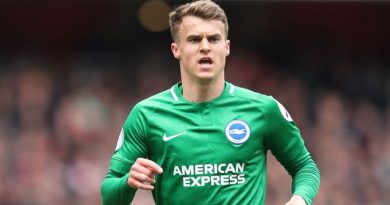How Brighton can maintain their edge in the transfer market
In the late evening of Monday 14th August, reports started to circulate on social media that Brighton had identified a midfield replacement for Moises Caicedo.
The player in question? Carlos Baleba, a 19-year-old Cameroonian playing in France for LOSC Lille. The same club the Albion signed Yves Bissouma from. By lunchtime the next day, Baleba was unexpectedly now in the sights of both Liverpool and Newcastle United.
On the morning of Wednesday 15th August, news broke that Brighton were close to agreeing terms with 19-year-old left back Valentin Barco of Boca Juniors. By 7pm that same day, it was being reported that Manchester City had offered to pay Boca the release clause in Barco’s contract.
This all followed hot on the heels of Gary Lineker very publicly touting Evan Ferguson as a replacement for Harry Kane at Spurs.
Most Brighton fans know and accept that our very best players are going to leave for bigger clubs and better wages after one, two or if we are lucky, three years in the squad.
Caicedo and Marc Cucurella departed for Chelsea barely before the plates from the awards ceremony at which they were crowned Player of the Season had been cleared away.
So too Ben White, who was off to Arsenal just weeks after picking up his award at the end of the 2020-21 campaign. The Albion’s three most recent Players of the Season winners all sold for a combined £222 million pounds.
Neither White nor Cucurella departing was keenly felt by Brighton thanks to the club’s famed succession planning. When a player goes, who takes over has already been identified and targeted, either from the development squad or the transfer market.
The fear of course is that this strategy might one day falter for one of several reasons. Say, for example, bigger clubs look at who Brighton are targeting and gazump the Albion with larger offers we cannot compete with. Copying our homework, if you like.
Is the sudden interest in Baleba and Barco from Liverpool, Newcastle and City immediately after the Albion showed their hand a sign this is starting to happen already?
In the case of Ferguson, the fear is that other clubs will swoop to take our talent before we truly see what they are capable of.
It feels like we have barely scratched the surface with the Irish teenager. Who knows what he and the Albion can achieve if he stays for one or two full seasons at the Amex?
Senior staff like Dan Ashworth and Paul Winstanley going to Newcastle and Chelsea is another fear. Has the Albion’s data driven recruitment advantage been eroded by former employees taking some of the knowledge about how it all works elsewhere?
And what is to stop clubs – like Chelsea again – with near limitless funds and apparently in possession of an accounting wheeze that gets around the Financial Fair Play rules from simply hoovering up all the young talent worldwide?
Might the Big Six cartel and Newcastle conclude it is better for them to sign every single player with a bit of potential and stick them on their bench or in their academies, rather than risk Brighton developing them and breaking into the top six at the same time?
The reality of course is not quite so simple as this tale of evil billionaires snapping up our signings from under our noses after reading about them on the internet.
Gone are the days of players being signed from total obscurity and in total secrecy. Statistics on pretty much every league in the world are now relatively easy to come by online.
You do not need to fly to Mar Del Plata to watch the latest teenage prospect in action for Club Atletico Alvarado. Just stream it.
Brighton are by no means the only club fishing in far flung oceans of footballing talent; others are out there, casting their nets in South America and Asia too.
We all like to hear pundits and journalists exclaim: “Where do Brighton unearth these hidden gems?!” But it is not like people aren’t aware of who the most valuable player in the Lille starting XI is.
Barco was featured in The Guardian’s ‘Next Generation’ list of players to watch as far back as 2021. It might have even been said list that the Albion picked him up from.
Brighton have arguably the best recruitment team in English football, but we are now competing with the biggest and the best not just in England but around the globe.
And just as we have seen our best players poached by the likes of Chelsea, Liverpool, Arsenal and Newcastle, so those clubs are losing players offered huge amounts of money to the Saudi Pro League
Soccer in the USA will not stop at Messi, either. Attendances and profits are growing in North America and the 2026 World Cup in the USA, Canada and Mexico will only heighten the appeal.
MLS could become an even more serious player over the next decade, rivalling the spending power of Saudi Arabia and the pulling power of Europe.
Where the Big Six in England could once count on being top of the food chain, they now have competition. And that means they will find themselves increasing looking for emerging talent rather than being able to buy established stars like Messi, Neymar or Kylian Mbappe.
What we are seeing is bigger fish forced into the same waters Brighton are used to successfully swimming in because of the arrival of new Saudi and American predators.
How can Brighton compete with those clubs and continue to attract the best young players? As Henry Winter set out in The Times this week, the Albion have an appeal which goes beyond money or having won some trophies in the past.
Brighton offer a clearly laid out career development path. The Amex is a proven environment for young players with no experience of the UK to thrive, where their families know they will be well looked after.
There is the prospect of greater first team opportunities. Do well when given those opportunities and it can ultimately lead to a dream transfer to a bigger name team.
Brighton is not the pressure cooker of somewhere like Chelsea, where short-term success and immediate results are demanded to the detriment of all else. Good young players do not become collateral damage at the Amex because winning is everything.
We are punching above our financial weight in what for now is still the most competitive and unrelenting football league on the planet.
When it comes to recruitment, the Albion will know the increasing competition for players means they need to work harder and smarter to grow the squad and fill the gaps left by inevitable departures.
In the transfer market, we as fans can only be spectators. But when matchday comes around, we can play our part by creating an atmosphere that players want to be part of.
Caicedo and Mac Allister both left Brighton paying tribute to the club and its fans. They credited their time in Sussex with helping turn them from young players with potential into polished diamonds, now holders of British record transfer fees and owners of World Cup winners medals.
That is something no amount of money can buy. And despite all those fears listed early, it was why Brighton can keep punching above their weight.
Warren Morgan @WarrenBHAFC




